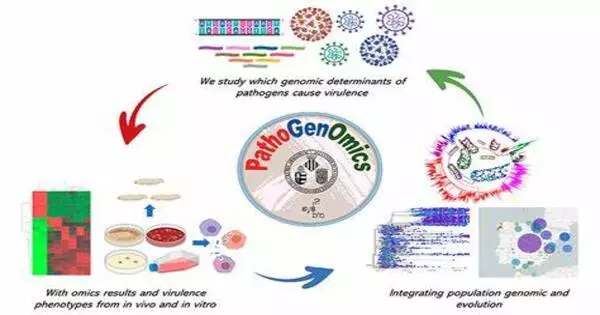Pathogenomics is a branch of biology that integrates genomics (the study of an organism’s entire gene set) with the study of pathogens, which are germs that can cause disease in other creatures, including humans. It is a field that studies programmed microbe resistance as well as virulence factors (VFs), which allow a bacterium to infect a host and possibly cause disease, using high-throughput screening technologies and bioinformatics.
Bacteria, viruses, fungi, and parasites are all pathogens. Pathogenomics is the study of disease-causing microbes’ genetic makeup, evolution, and virulence characteristics. This includes researching the genomes of pathogens that cannot be cultivated in the absence of a host. Previously, academics and medical personnel found it challenging to examine and comprehend the harmful characteristics of infectious organisms.
Here are some key aspects of pathogenomics:
- Genome Sequencing: It entails sequencing viruses’ whole genomes, which provides a thorough perspective of their genetic material. This data is essential for investigating pathogen genetic diversity and evolution.
- Comparative Genomics: Researchers examine the genomes of different pathogen strains or species to uncover genetic changes that may influence pathogenicity, antibiotic resistance, or other properties.
- Virulence Factors: It aids in the identification of virulence factors, which are genes and genetic components responsible for a pathogen’s ability to cause disease. Understanding these variables can help with the development of therapies and vaccinations.
- Drug Discovery: Knowledge of pathogen genomics can assist in the development of new drugs and therapies to target specific genetic vulnerabilities of pathogens. This is particularly important in the face of antibiotic resistance.
- Epidemiology: It can be used to trace the origins and transmission patterns of infectious diseases. By analyzing the genomes of pathogens, researchers can better understand the spread of diseases and devise strategies for containment and prevention.
- Vaccine Development: Pathogen genomics plays a crucial role in the development of vaccines. By identifying specific antigens and genetic markers in pathogens, researchers can design vaccines that elicit an immune response against these disease-causing agents.
- Diagnostics: To swiftly and accurately detect pathogens in clinical samples, genomic information can contribute to the development of molecular diagnostic procedures such as PCR assays or next-generation sequencing.
Pathogen genomes may now be found and sequenced in considerably less time and at a lower cost, boosting the ability to diagnose, treat, forecast, and prevent pathogenic illnesses and diseases. It has also enabled researchers to obtain a better understanding of genome evolution events – gene loss, gain, duplication, and rearrangement – and how these changes affect pathogen resistance and disease-causing ability.
















